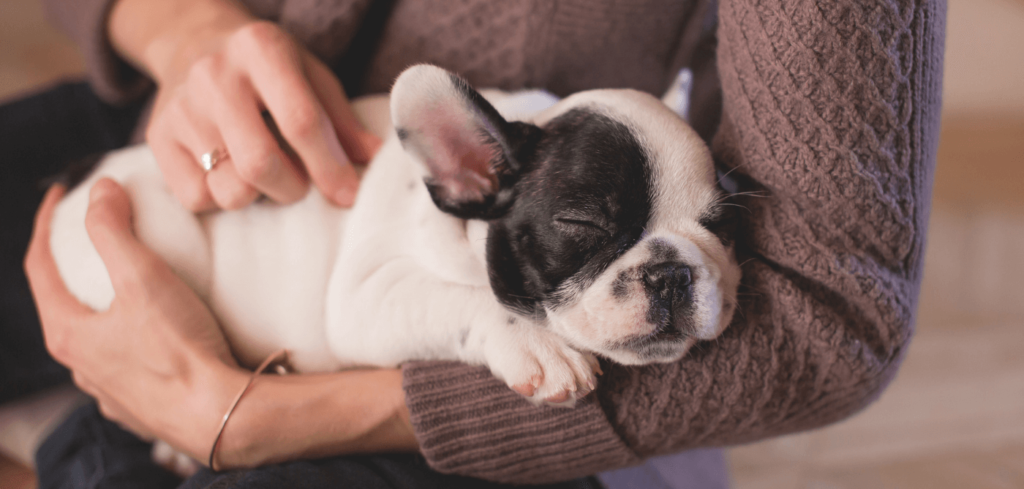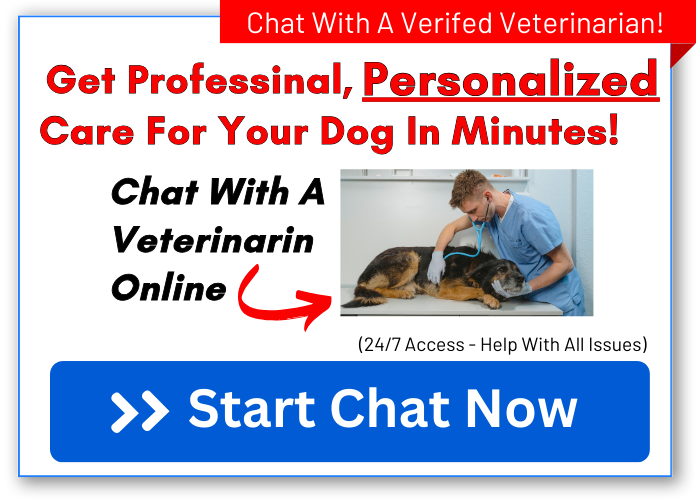
Have you ever looked down to hear your dog making a huffing or honking noise at you?
This huffing is also sometimes referred to as “reverse sneezing” and it’s called this because, in a way, it’s almost like a backwards sneeze…
But is dog huffing a medical concern you should be worried about or is it just something harmless that happens with some dogs?
In this article, we’ll be answering those types of questions by going over the following information…
- What Does Dog Huffing Mean?
- Why Is My Dog Huffing?
- Reverse Sneezing In Small Dogs
- What To Do When Your Dog Is Huffing
- How To Stop A Dog From Huffing Quickly (And Prevent It In The Future)
In the end, you’ll know why your dog is huffing through his or her nose, if it’s something you should be concerned about, and what you should do about it when it happens…

What Does Dog Huffing Mean?
Dog huffing is when your dog is inhaling air through his or her nose in a quick and forceful manner…
It basically occurs because of an involuntary muscle spasm in the back of your dog’s throat…

As I mentioned earlier, it’s sometimes referred to as “reverse sneezing”, but the technical term you might hear a veterinarian use is “inspiratory paroxysmal respiration”…
Some dogs will have huffing episodes throughout their whole lives; however, sometimes an old dog will start huffing much later in his or her life…
Watch This Video To Learn More About Huffing…
Why Is My Dog Huffing?
Dog huffing most commonly happens because your dog is trying to expel an irritant in his nasal cavity or throat…
Things like allergies, nasal mites, or an intolerance to exercise could all cause huffing through your dog’s nose…
In addition to that, modern household cleaners with strong chemicals can sometimes prove to be irritating to your dog’s nose or throat…
Additionally, Isopropyl alcohol is another common substance that can cause reverse sneezing issues, and other potential causes for your dog huffing include…
- when you dog contracts a virus
- when he or she is excited
- when your dog pulls on a leash
- when your dog is running or exercising
- when your dog is eating and drinking
- when your dog smells strong perfume
- when your dog inhales second-hand smoke
- when your dog has any foregin bodies caught in his or her throat
If your dog has never experienced huffing before, it’s a good idea to contact a veterinarian after the first episode…
The vet may be able to get to the root cause of the issue; however, many times the cause remains unknown…
In addition to that, the vet will be able to properly identify if your dog was actually huffing and not choking or coughing due to another issue…

Reverse Sneezing In Small Dogs…
Dog breeds with short snouts or flat faces have the highest risk of huffing. These “Brachycephalic” breeds typically have elongated soft palates into their throat…
And at times, these dogs will suck the elongated palate into their throat when they inhale, which then will cause them to start huffing…
In addition to that, other small dog breeds have a higher risk of huffing possibly because they have small throats…
For your guidance, here is a list of some of the breeds that are most susceptible to huffing:
- Bulldogs
- Shih Tzus
- Boxers
- Pugs
- Yorkies
- Beagles
- Chihuahua
What To Do When Your Dog Is Huffing…
A typical huffing episode lasts for around 30 seconds, but with more severe cases huffing may last for a few minutes and might happen several times per day…
During the huffing episode, your dog may struggle to inhale. This can cause a level of anxiety for you and your pup, but it usually isn’t dangerous…

If your dog huffs infrequently, there really isn’t too much for you to worry about. In fact, in most cases, huffing requires no treatment at all because after a few seconds the reverse sneezing ends and your dog is able to inhale normally again…
That being said, there are some cases in which your dog is made so uncomfortable by huffing that he or she doesn’t want to exercise, play, or function normally…
And even worse than that, there are severe cases in which a dog’s throat may collapse altogether…
So if you notice that your dog has a regular huffing problem, it’s a good idea to contact a veterinarian to discuss the issue further…

Minor And Infrequent Cases Of Dog Huffing…
As I mentioned earlier, minor and infrequent cases of dog huffing are usually harmless. Your dog might start huffing when he gets excited, and after a few seconds the spasm stops and he’s able to breathe properly again…
These types of cases usually don’t require any form of treatment, but that being said, there are some things you can try to end a dog huffing episode quicker…
One method that you can try using is to gently massage your dog’s throat and speak to them in a soothing voice until the spasm stops…
In addition to that, it’s sometimes helpful to cover your dog’s nostrils for a moment, which might get your dog to swallow and clear out whatever irritation caused the huffing to start in the first place…
Another thing you can try is to gently blow on your dog’s face as a way of getting him or her to swallow…
And you can also try opening your dog’s mouth and gently pressing down on their tongue to hopefully put an end to the spasm…
Severe And Frequent Cases Of Huffing…
If your dog has frequent cases of huffing or if they seem severe you should definitely contact a veterinarian for guidance…

The veterinarian will be able to rule out other potentially serious problems such as choking, and if necessary, you may be asked to bring your dog in for an appointment…
From there, the vet will examine your dog to try to get to the bottom of what is causing the huffing in the first place…
One of the things the vet might start with is to take a chest X-ray of your dog. He or she might also want to do a rhinoscopy…

A rhinoscopy is when the vet sends a flexible scope into your dog’s nasal cavity and throat to look for anything abnormal or unusual that could be causing the huffing…
It’s a relatively simple procedure, but the vet will give your dog anesthesia and it also requires a tube down your dog’s throat to assist him or her with breathing…
Sometimes with severe cases and ongoing huffing attacks, the vet may prescribe antihistamines if he or she determines that an allergic reaction is causing the huffing…
Benedryl, Claritin and Zyrtec are the most commonly used antihistamines for dogs, and they’re normally safe…
But in some cases, they may make your dog feel drowsy or hyperactive…
How To Stop A Dog From Huffing Quickly (And Prevent It In The Future)…
One of the biggest keys to stopping a dog from huffing is identifying what the cause is. This is sometimes difficult to do, but it all starts with paying special attention to your dog when a huffing episode starts…
You’ll want to start by asking yourself questions to narrow down what might be causing the issue…
Questions such as the following might be helpful:
- Did the episode happen when you switched to a new dog food?
- Was something sprayed in the air to clean?
- Was a certain candle lit just before the episode started?
- Are you or is someone in your household a smoker in which case your dog would be breathing in secondhand smoke frequently?
There really are numerous possibilities as to what could be causing your dog to huff…
But the following information might help you end your dog’s huffing episodes quickly and possibly prevent them from happening in the future…
Use The Calming Techniques To Stop A Huffing Episode…
If your dog is huffing when excited or stressed out, it’s a good idea to try using the calming techniques to hopefully end the spasm quickly…
Again these techniques include…
- Gently massaging your dog’s throat
- Speaking to your dog in a calm and soothing voice
- Covering your dog’s nostrils for a second to get your dog to swallow (and hopeful remove the irritant)
- Gently blowing on your dog’s face to get him or her to swallow
- Opening your dog’s mouth and pressing down on his or her tongue to end the spasm
Use Pet-Friendly Cleaning Products…
As I mentioned earlier, there are a lot of household cleaning products that can cause your dog to have a huffing episode…

The good news is that there are a number of pet-friendly cleaning products, and they’re not really any more expensive than standard cleaning products that you’ll find…
I personally like Rocco And Roxie’s cleaners, but there are a number of other great products out there as well.
Use A Dehumidifier…
Another common cause of huffing would be if your dog has allergies. Again, you should always contact a vet before giving your dog any type of medicine for allergies…
But one thing you can do to help out your pup is to start using a dehumidifier. Things like dust mites and mold tend to thrive in homes that have humidity levels of over 50 percent…
However, if you lower the humidity level in your home slightly, you could improve the air quality for your whole family (and that includes your dog)…
It’s still a good idea to contact a vet if you have concerns over your dog’s huffing or just your dog’s allergies in general, but using a dehumidifier might be helpful.

Dog Huffing – Final Thoughts…
If you notice your dog huffing for the first time, it can be a pretty frightening experience…
But that being said, in most cases, you don’t have to panic because the huffing won’t pose a serious risk to his or her health…
It is still a good idea to contact a veterinarian to rule out other issues that could be serious to your dog’s health…
But in general, it’s perfectly normal for dogs to huff and make honking noises while these short spasms get worked out in their throats…
Just remember to remain calm if you notice your dog having a huffing episode, try to soothe your dog while the spasm occurs, and talk to a vet to rule out any serious medical issues.